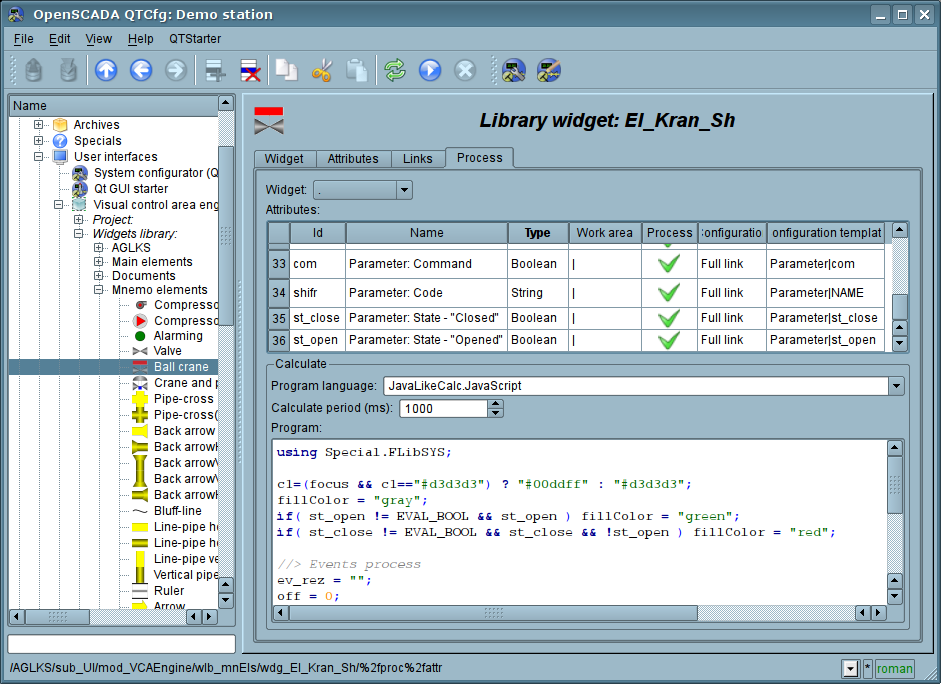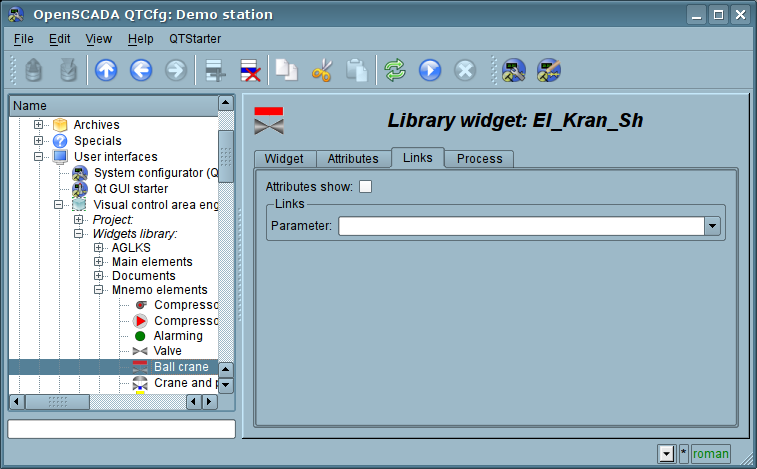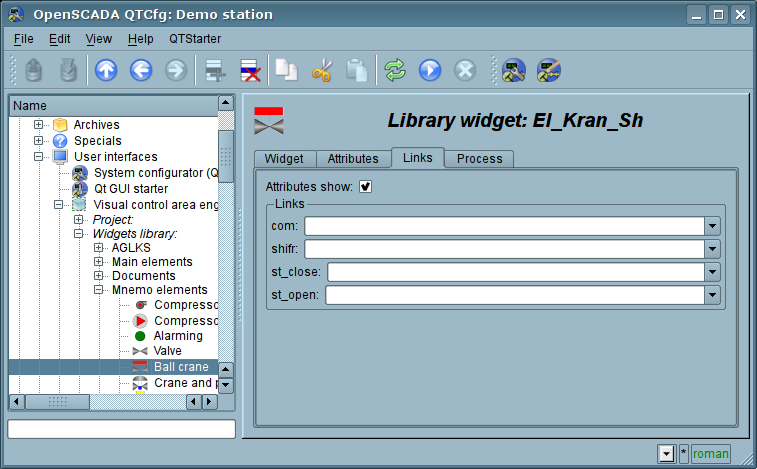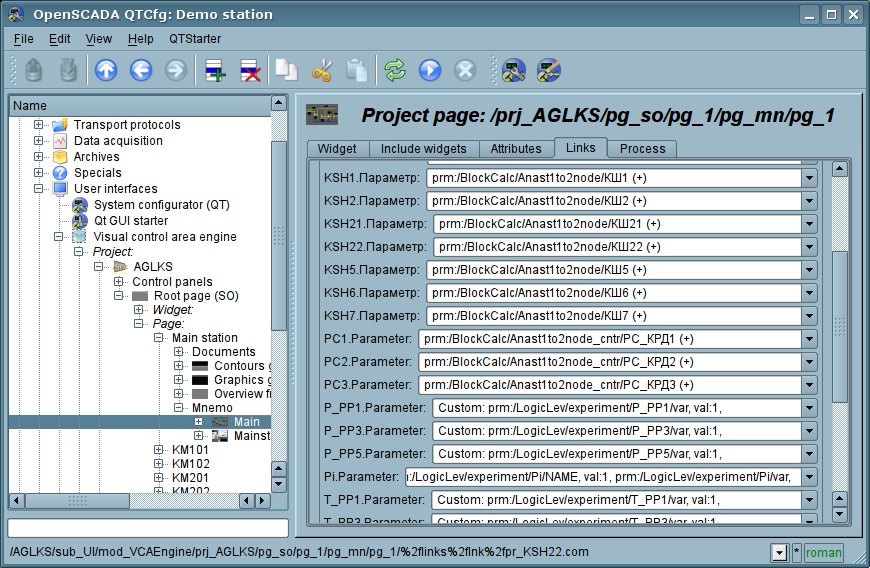4.9. Linkage with the dynamics
To provide relevant data in the visualization interface the data of subsystems "Data acquisition (DAQ)" must be used. The nature of these data as follows:
- parameters that contain some number of attributes;
- attributes of the parameter can provide information of four types: Boolean, Integer, Real and String;
- attributes of the parameter can have their history (archive);
- attributes of the parameter can be set to read, write, and with full access.
Considering the first paragraph it is necessary to allow the possibility of the group of destination links. To do this we use the conception of of the logic level (RU).
In accordance with paragraph 2, links provide transparent conversion of connection types and do not require special configuration.
To satisfy the opportunities for access to archives, in accordance with paragraph 3, links make check of the type of the attribute, and in the case of connection to the "Address", the address of linkage is put into the value.
In terms of the VCA, the dynamic links and configuration of the dynamics are the one process, to describe a configuration of which the tab "Processing" of the widgets is provided (Fig.4.9.a). The tab contains a table of configuration of the properties of the attributes of the widget and the text of calculation procedure of the widget.

Fig. 4.9.a The tab "Processing" of the configuration page of the widget.
In addition to configuration fields of the attributes the column "Processing" in the table is provided, for selective using of the attributes of the widgets in the computational procedure of the widget, and the columns "Configuration" and "Configuration template", to describe the configuration of links.
Column "Configuration" allows you to specify the linkage type for the attribute of the widget:
- Constant - in the tab of widget links the field for indication of a constant appears, for example of the special color or header for the template frames;
- Input link - linkage with the dynamics for a read-only;
- Output link - linkage with the dynamics just for the record;
- Full link - complete linkage with dynamic (read/write).
Column "Configuration template" makes it possible to describe the groups of dynamic attributes. For example it may be different types of parameters of subsystem "DAQ". Furthermore, in the case of correct formation of this field, the mechanism of automatically assign of the attributes with the only indication of the parameter of subsystem "DAQ" is working, which simplifies and accelerates the configuration process. The value of this column has the following format: <Parameter>|<identifier>, where:
- <Parameter> - the group of the attribute;
- <Identifier> - identifier of the attribute, this value is compared with the attributes of the DAQ parameters with automatic linkage, after the group link indication.
Installation of the links may be of several types, which are determined by the prefix:
- val: - Direct download of the value through the links mechanism. For example, link: "val:100" loads in the attribute of the widget the value of the 100. It is often used in the case of absence of end point of the link, in order to direct value indicating.
- prm: - Link to the attribute of the parameter or parameter, in general, for a group of attributes, of subsystem "Data acquisition". For example, the link "prm:/LogicLev/experiment/Pi/var" implements the access of the attribute of the widget to the attribute of the parameter of subsystem "Data acquisition".
- wdg: - Link to an attribute of another widget or a widget, in general, for a group of attributes. For example, the link "wdg:/ses_AGLKS/pg_so/pg_1/pg_ggraph/pg_1/a_bordColor" implements the access of the attribute of one widget to the attribute of another one. At that moment this type of link is not intended for installation by the user manually, and is installed automatically in the mode of dynamic linkage!
Processing of the links occurs at a frequency of calculating the widget in the following order:
- Receiving of the data from input links.
- The implementation of calculating of the script.
- Transmission of the values by the output links.
In the Fig. 4.9.b the tab of links with the group assignment of the attributes by the only specifying the parameter is presented, and in Fig. 4.9.c - with the individual appointment of the attributes.

Fig. 4.9.b Tab "Links" of the page of configuration of the widget with the group assignment of the attributes by the only specifying of the parameter.

Fig. 4.9.c Tab "Links" of the page of configuration of the widget with the individual appointment of the attributes.
When the widget that contains the configuration of links is placed to the container of widgets, all links of the source widget is added to the list of resulting links of the widgets' container (Fig. 4.9.d)

Fig. 4.9.d Tab "Links" of the page of configuration of the container of widgets, including widgets with links.
The aforesaid shows that the links are set by the user in the configuration interface. However, for the possibility of creation of the frames for general use, with the function of providing detailed data of various sources of the same type, a dynamic linkage mechanism is necessary. Such an mechanism is provided through a reserved key identifier "<page>" of the group of attributes of links in the frames of general purpose and dynamic linkage with the identifier "<page>" in the process of opening of the frame of general purpose by means of the signal from another widget.
Lets examine the example when we have the frame of general-purpose "Control panel of graph" and a lot of "Graphs" in different tabs. "Control panel of graph" has links with the templates:
- tSek --> "<page>|tSek"
- tSize --> "<page>|tSize"
- trcPer --> "<page>|trcPer"
- valArch --> "<page>|valArch"
At the same time, each widget "Graph" has the attributes tSek, tSize, trcPer and valArch. In the case of a calling of the opening signal of "Control panel of graph" from any widget "Graph" it is happening the linkage of the attributes of the "Control panel of graph" in accordance with the attribute specified in the template with the attribute of the widget "Graph". As a result, all changes in the "Control panel of graph" will be displayed on the graph by means of the link.
In the case of presence of external links to the parameters of subsystem "Data acquisition" in the widget "Graph", the links of "Control panel of graph" will be installed on an external source. In addition, if in the "Control panel of graph" will be declared the links to the missing attributes directly in the widget "Graph", it will be made the search for the availability of such attributes from an external source, the first to which the link is directed, performing, thus, the addition of missing links.
To visualize this mechanism the table 4.9 is cited.
Table 4.9. The mechanism of the dynamic linkage.
| Attributes of the "Control panel of graph" (the template of dynamic linkage) | "Graph" attributes | Attributes of an external "Parameter" | The resulting link or an value of the linking attribute |
| tSek (<page>|tSek) | tSek | - | "Graph".tSek |
| tSize (<page>|tSize) | tSize | - | "Graph".tSize |
| trcPer (<page>|trcPer) | trcPer | - | "Graph".trcPer |
| valArch (<page>|valArch) | valArch | - | "Graph".valArch |
| var (<page>|var) | var | var | "Parameter".var |
| ed (<page>|ed) | - | ed | "Parameter".ed |
| max (<page>|max) | - | - | EVAL |
| min (<page>|min) | - | - | EVAL |